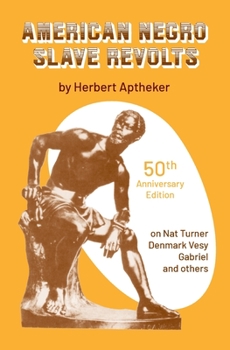American Negro Slave Revolts
Select Format
Select Condition 
Book Overview
Years ago, the controlling view held that the response of the slaves in the United States to their bondage "was one of passivity and docility". That opinion, so decisive a part of the chauvinism afflicting the nation, is shown to be false in this book and in the material accumulated since its initial appearance has further substantiated this thesis; namely, that the African-American people, in slavery, forged a record of discontent and of resistance...
Format:Paperback
Language:English
ISBN:0717806057
ISBN13:9780717806058
Release Date:September 2021
Publisher:International Publishers
Length:434 Pages
Weight:1.00 lbs.
Dimensions:0.8" x 5.4" x 8.0"
Customer Reviews
2 ratings
A classic
Published by Thriftbooks.com User , 17 years ago
This book was originally Aptheker's PhD thesis and was written to de-bunk the idea that the enslaved Africans were docile and accepting of their lot. After reading this book, you will know that they were not docile or accepting of their lot and that slave revolts were more or less constant from the beginning of slavery. It's not a fun read -- it's quite dry and mostly a carefully researched and documented listing of facts. But after you read it, your attitude toward how slavery affected the people enslaved will be different. You'll know how the Ku Klux Klan came to be, how powerful the African-American people and culture were even while subjected to slavery, and you'll be able to spot so many lies that are being told today about slavery, black people in America, and white people in America. Go ahead, read it. Yes, it's a little dry but it will change your life. It reads a lot faster if you skip the numerous footnotes.
200 years of slave insurrections
Published by Thriftbooks.com User , 22 years ago
The author provides a "narrative of the numerous plots and rebellions that persistently rocked American slave society for over two centuries" (p.367). In so doing he hopes to dispel the generally accepted notion that the response of the American Negro to his bondage "was one of passivity and docility" (p.374). Behind this notion of docility lies the belief that African-American slaves were well treated by their masters, generally contented with their lot, and inferior to whites. Jefferson Davis asserted this notion of docility on January 10, 1861 in the United States Senate in "Declaring that he found the speculations as to whether 'our servants' would rebel or not 'exceedingly offensive' he went on to assert: 'Governments have tampered with slaves; bad men have gone among the ignorant and credulous people, and incited them to murder and arson; but of themselves - moving by themselves - I say history does not chronicle a case of Negro insurrection. (p.105)."Herbert Aptheker's meticulous documentation of hundreds of cases of slave resistance, which often resulted in the death or grisly punishment of the slaves, easily refutes statements denying African-American discontent and rebelliousness. His collection of materials is quite remarkable, for slave state newspapers censored most accounts of insurrections. "The particulars, we are constrained to observe, must be withheld for the present, from motives of precaution (p.158)" typically wrote one Virginia newspaper. To achieve his narrative, Aptheker drew upon "government archives, personal letters (sometimes published in distant newspapers), journals, diaries, and court records (p.159)." The Aptheker book should be a standard reference work for anyone exploring this topic.In arranging his materials, the author first discusses slave insurrection according to major themes, and then he describes the insurrections in chronological order. This reader sometimes felt overwhelmed with example after example of insurrection, especially when they were treated chronologically. The thematic chapters on: "The Fear of Rebellion", "The Machinery of Control", and "Exaggeration, Distortion, Censorship" were particularly rich in materials that highlighted the American slave society's predicament. Many slave owners had valiantly fought in the Revolutionary war and championed republican principles. Yet, slave ownership was driving them away from these same principles by requiring them to place increasing limitations on free assembly, free speech, a free press and jury trials. Slave society began to live in a general siege atmosphere, especially after the Haitian revolution. Aptheker quotes one Virginian on the possibility of a slave insurrection; "I wish I could maintain, with truth ... that it was a small danger, but it is a great danger, it is a danger which has increased, is increasing, and must be diminished, or it must come to its regular catastrophe (p. 49)". In such a growing atmosphere of fear, the




